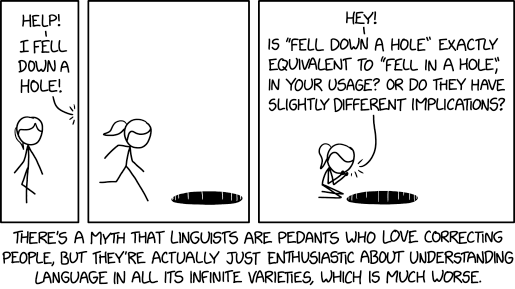Linguistics Humor
Do you like languages and linguistics ? Here is for having fun about it
Share this community: [!linguistics_humor@sh.itjust.works](/c/linguistics_humor@sh.itjust.works)
Serious Linguistics community: !linguistics@mander.xyz
Rules:
- 1- Stay on Topic
Not about Linguistics, language, ways of communications - 2- No Racism/Violence
- 3- No Public Shaming
Shaming someone that could be identifiable/recognizable - 4- Avoid spam and duplicates
Thank you! I should've linked it in the OP. My bad, fixing it right now!
No worries, I was looking for the explain xkcd and the comic url was there for me to share :)
I feel like I'd use "Fell in a hole" if I took up most of the space of the hole, and could probably get out on my own, while I'd use "Fell down a hole" if I took up very little of the space of the hole, and couldn't get out on my own.
Similar for me - I think the depth of the hole matters more? It would sound odd to say "I fell down a pothole".
If I were to rely on my "guts":
- I fell in a hole - I was already inside the hole, and I fell.
- I fell down a hole - I fell completely, I reached the ground of that hole.
- I fell into a hole - I was outside the hole, and my fall made me enter the hole. That's probably how I'd use it, in a typical situation.
However I'm not a native speaker, and my L1 is rather relaxed when it comes to what prepositions convey. And from a quick websearch, Google lists 3.3M occurrences for "fell in a hole", 2.2M occurrences for "fell into a hole" and 820k for "fell down a hole"; that hints for me that, by default, speakers would use "in a hole" here, unlike I would.
I am a native speaker, and I do take my word choices very seriously - often to the point of pausing during conversations to find the exact phrasing which will convey the shade of meaning I am looking to convey. I wrote fiction for a while, and it was always extremely important to me to get phrasing right.
I agree with you completely. While I would interpret all of those phrases as equivalent (based on context) if they were to come from someone else, I would tend to use them in exactly the ways you suggest.
If I was walking and stumbled into a hole: "fell in a hole"
If I was climbing in/around the hole intentionally and stumbled: "fell down a hole"
It all depends on how actively involved with the hole I was and if I knew of it's existence.
As a non-native speaker, wouldn't falling in the hole be the act of crossing the opening, and falling down the hole be the rest of the way?
As a native English speaker, I had no idea going into this discussion, but that sounds like a pretty good explanation!
Now, is there a difference between falling down and falling into the hole?...
I would have guessed that into and in are interchangeable for this case, at least in US English. But in other contexts into is a direction, in is a position.
Falling into it includes the travel time (potentially from a great height), whereas in mostly pertains to the end state?
That would mean into and down refer to different parts of the falling timeline.
Instead of the travel time, I think that the matter here is the movement: "into" implies movement, so it can be only used when there's a change in position. And the interchangeability in this case is caused by the fact that, while "in" doesn't imply movement, it doesn't imply its lack either.
Other IE languages also show this sort of grammatical movement marking, although through different ways. For reference, in Latin:
- cecidi in foveam - I fell into a hole (accusative because movement)
- cecidi in foveā - I fell in a hole (dative; I'd interpret it as lack of movement, unlike English "in", but I'm not certain on that)
English also used to have this distinction in the auxiliary verbs that you'd use with the past - "be" if there's movement (even metaphorical), "have" otherwise. You see this for example in Oppenheimer's translation of Bhagavad Gita, "I am become Death" (modern: "I have become Death"), but eventually this usage of "be" was completely replaced with "have". German still does it but... it's complicated since movement itself isn't the sole factor, the main verb also dictates the auxiliary to some degree:
- ich bin in ein Loch gefallen - I have fell into a hole
- ich *habe in ein Loch gefallen - this simply sounds weird
Meanwhile in Swedish, leaving out either word would sound super wrong. I fell down in a hole.
